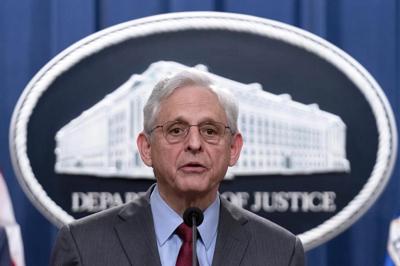WASHINGTON (AP) — House Republicans on Monday filed a lawsuit against Attorney General Merrick Garland for the audio recording of President Joe Biden's interview with a special counsel in his classified documents case, asking the courts to enforce their subpoena and reject the White House's effort to withhold the materials from Congress.
The lawsuit filed by the House Judiciary Committee marks Republicans' latest broadside against the Justice Department as partisan conflict over the rule of law animates . The legal action comes weeks after the White House blocked Garland from releasing the audio recording to Congress by asserting executive privilege.
Republicans in the House responded by voting to make Garland the third attorney general in U.S. history to be . But the Justice Department refused to take up the contempt referral, citing the agency’s “longstanding position and uniform practice” to not prosecute officials who don’t comply with subpoenas because of a president’s claim of executive privilege.
The lawsuit states that Speaker Mike Johnson, R-La., made a “last-ditch effort” last week to Garland to resolve the issue without taking legal action but the attorney general referred the Republicans to the White House, which rebuffed the “effort to find a solution to this impasse.”
Garland has defended the Justice Department, saying officials have gone to extraordinary lengths to provide information to the committees about classified documents investigation, including a transcript of Biden’s interview with him.
The congressional inquiry began with the release of in February, which found evidence that Biden, a Democrat, willfully retained and shared highly classified information when he was a private citizen. Yet the special counsel concluded that criminal charges were not warranted.
Republicans, incensed by Hur’s decision, issued a subpoena for audio of his interviews with Biden during the spring. But the Justice Department turned over only some of the records, leaving out audio of the interview with the president.
“The audio recordings, not the cold transcripts, are the best available evidence of how President Biden presented himself during the interview,” the lawsuit reads. “The Committee thus needs those recordings to assess the Special Counsel’s characterization of the President, which he and White House lawyers have forcefully disputed, and ultimate recommendation that President Biden should not be prosecuted.”
On the last day to comply with the Republicans’ subpoena for the audio, the White House blocked the release by invoking executive privilege. It said that Republicans in Congress only wanted the recordings “to chop them up” and use them for political purposes.
But Republicans maintain that access to both the audio recordings and the transcripts are warranted to determine if legislative reforms need to be put in place for the storage, handling and disclosure of sensitive documents by members of the executive branch. Prolonging the investigation also keeps attention on parts of Hur’s report that were politically damaging to Biden as he seeks reelection against former President Donald Trump, the presumptive GOP nominee, in November.
Beyond the bitingly critical assessment of Biden’s handling of sensitive government records, Hur offered unflattering characterizations of the Democratic president’s memory in his report, sparking fresh that cut at voters’ most deep-seated concerns about the 81-year-old seeking a second term.
“We need the audio recordings and the transcripts,” Rep. Jim Jordan, the GOP chair of the House Judiciary Committee, said during a hearing Thursday. “Put simply, they are the best evidence of the president’s mental state.”
Executive privilege gives presidents the right to keep information from the courts, Congress and the public to protect the confidentiality of decision-making, though it can be challenged in court. Administrations of both major political parties have long held the position that officials who assert a president’s claim of executive privilege can’t be prosecuted for contempt of Congress, a Justice Department official told Republicans last month.
Assistant Attorney General Carlos Felipe Uriarte cited a committee’s decision in 2008 to back down from a contempt effort after President George W. Bush asserted executive privilege to keep Congress from getting records involving Vice President Dick Cheney.
The White House and congressional Democrats have slammed Republicans’ motives for pursuing contempt and dismissed their efforts to obtain the audio as purely political. They also pointed out that Jordan defied his own congressional subpoena in the last session.
It's unclear how the lawsuit against Garland will play out. Courts have not had much to say about executive privilege. But in the 1974 case over President Richard Nixon’s refusal to release Oval Office recordings as part of t , the Supreme Court held that the privilege is not absolute. In other words, the case for turning over documents or allowing testimony may be more compelling than arguments for withholding them. In that context, the court ruled 8-0 that Nixon had to turn over the tapes.
When it came to the Watergate tapes, the Supreme Court said it had the final word, and lower courts have occasionally weighed in to resolve other disputes. But courts also have made clear they prefer that the White House and Congress resolve their disagreements without judicial intervention, when possible.








































